
Mineral Economics
Scope & Guideline
Connecting Scholars to Global Mineral Challenges
Introduction
Aims and Scopes
- Economic Analysis of Mineral Resources:
The journal focuses on economic assessments related to mineral resources, including price forecasting, economic impacts of mining activities, and the role of minerals in economic growth. - Sustainability and Environmental Impact:
A significant emphasis is placed on sustainability practices within the mining sector, examining environmental impacts, social license, and corporate social responsibility (CSR) initiatives. - Policy and Governance:
The journal addresses the development and assessment of policies governing mineral resources, including legal frameworks, governance models, and implications for indigenous rights and community engagement. - Technological Innovation:
Research on technological advancements in mining practices, including innovations in extraction methods, recycling, and the use of artificial intelligence for resource management, is a core focus area. - Geopolitical and Global Contexts:
The journal explores the geopolitical implications of mineral resource extraction, trade dynamics, and the criticality of minerals in global supply chains.
Trending and Emerging
- Critical Minerals and Supply Chains:
There is a growing focus on critical minerals, particularly in relation to their role in clean energy transitions and geopolitical strategies, highlighting the importance of securing supply chains. - Impact of Climate Change on Mining Practices:
Research examining the intersection of climate change and mining practices is on the rise, with studies exploring how mining operations can adapt to and mitigate climate risks. - Technological Integration in Mining:
The integration of advanced technologies, such as machine learning and big data analytics, into mining practices is increasingly prominent, reflecting a shift towards data-driven decision-making. - Social and Community Impacts of Mining:
Emerging themes include the socio-economic impacts of mining on local communities, particularly regarding indigenous rights, social licensing, and community development. - Environmental, Social, and Governance (ESG) Metrics:
There is an increased emphasis on ESG metrics in evaluating mining companies, reflecting a broader trend towards responsible mining practices and accountability.
Declining or Waning
- Historical Mining Practices:
Research focused on historical mining practices and their long-term impacts has decreased, as contemporary studies shift towards current practices and future sustainability. - Simple Economic Models:
The reliance on simplistic economic models without integrating complex variables has waned, as scholars increasingly prefer multifaceted approaches that consider various economic, environmental, and social factors. - Non-renewable Resource Extraction without Contextual Analysis:
Studies that analyze non-renewable resource extraction in isolation, without considering broader economic or ecological contexts, appear to be declining in favor of more integrated analyses.
Similar Journals
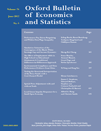
OXFORD BULLETIN OF ECONOMICS AND STATISTICS
Connecting theory and practice in economics and statistics.The Oxford Bulletin of Economics and Statistics, published by Wiley, stands as a leading journal in the realms of Economics, Econometrics, and Statistics. Since its inception in 1973 and converging through to 2024, the journal has consistently positioned itself in the top quartile (Q1) across multiple categories, including Economics and Econometrics, Social Sciences, and Statistics and Probability, highlighting its influential status in the academic community. With a commendable ranking within Scopus, notably ranked #53 in Social Sciences and #28 in Statistics and Probability, it serves as a critical platform for disseminating rigorous research and innovative methodologies. Researchers, professionals, and students are encouraged to contribute and engage with the high-quality content that defines this esteemed journal, which does not currently offer Open Access but remains a pivotal resource for those seeking to deepen their understanding of economic and statistical paradigms in the pressing global landscape.

Malaysian Journal of Economic Studies
Illuminating Economic Trends and Policy ImplicationsMalaysian Journal of Economic Studies is a prominent peer-reviewed academic journal dedicated to advancing the field of economics, econometrics, and finance. Published by PERSATUAN EKONOMI MALAYSIA, this journal has been a vital platform for scholarly research since its inception, with a publication history spanning from 2007 to 2024. With an impressive Q3 quartile rank in the Economics, Econometrics, and Finance category and a Scopus ranking that places it in the 44th percentile among its peers, the journal serves as a critical conduit for disseminating innovative economic research and findings that can inform policy-making and academic discourse. Although it currently does not offer Open Access, it remains committed to enhancing the visibility of economic research in Malaysia and beyond. Scholars, practitioners, and students alike will find this journal a valuable resource that not only reflects the evolving economic landscape but also contributes to a deeper understanding of economic phenomena on a global scale.

Journal of Mining Institute
Advancing the Frontiers of Earth SciencesThe Journal of Mining Institute, published by SAINT-PETERSBURG MINING UNIVERSITY, stands as a premier platform for disseminating cutting-edge research in the fields of Economic Geology, Geology, and Geotechnical Engineering. With an impressive Q1 ranking in various quartiles for 2023, this journal offers enlightening insights into earth sciences, reflecting its substantial impact within the academic community. The journal, accessible in open access format since 1975, ensures that researchers, professionals, and students can readily access high-quality research articles. The ISSN for the print version is 2411-3336 and E-ISSN 2541-9404, supporting its reach both online and offline. As it converges knowledge from 2017 to 2024, the Journal of Mining Institute serves as an essential resource for understanding contemporary challenges and innovations in mining and geology, encouraging a collaborative exploration of sustainable practices and technological advancements in these critical fields.

Transnational Corporations Review
Fostering Scholarly Discourse on Corporate StrategiesTransnational Corporations Review is a prestigious academic journal published by Elsevier Science Inc., housed in the Netherlands, which has established itself as a critical forum for the examination and analysis of transnational corporations’ roles in the global economy. With an impressive impact factor and consistent rankings within the Q2 and Q3 categories across fields such as Business and International Management, Development, and Finance, this journal offers invaluable insights that appeal to researchers, professionals, and students alike. The journal spans a broad spectrum of critical topics, focusing on the intersection of corporate strategies and international market dynamics and actively encourages contributions that enhance our understanding of economic and business environments. With a commitment to fostering scholarly discourse, Transnational Corporations Review serves as a vital resource for anyone interested in the complexities and challenges of contemporary transnational business operations. Current and past issues can be accessed via reputable academic databases, ensuring that this journal remains visible and impactful within the academic community.

Extractive Industries and Society
Illuminating the Path to Responsible Resource ManagementExtractive Industries and Society is a vital academic journal published by ELSEVIER SCI LTD, focusing on the intersection of extractive industries and their broader societal implications. Established in 2014, this multidisciplinary journal examines economic geology, planning, development, and environmental management issues surrounding the extractive sector. With an impressive impact factor and recognition in category quartiles, it ranks in Q1 in areas such as Development and Geography, and boasts notable Scopus rankings across various fields including Social Sciences and Earth Sciences, underscoring its significant contribution to contemporary research. The journal aims to foster scholarly discourse, providing a platform for rigorous studies that address policy, environmental, and socio-economic challenges linked to extractive practices. By engaging with this journal, researchers, professionals, and students can contribute to and benefit from cutting-edge insights that shape the future of sustainable resource management.
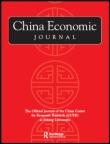
China Economic Journal
Fostering Rigorous Discourse on China's Global ImpactChina Economic Journal, published by Routledge Journals, Taylor & Francis Ltd, serves as a premier platform for scholarly discourse in the fields of Cultural Studies, Economics, and Sociology, with a notable impact factor reflecting its esteemed reputation. Since its inception in 2010, the journal has dedicated itself to advancing knowledge and understanding of the dynamic economic landscape of China, addressing critical issues that intersect with culture, policy, and society. With a strong quarterly ranking in prestigious categories — Q1 status in both Cultural Studies and Economics, as well as a reputable position in Sociology and Political Science — it stands among the top-tier journals globally. Researchers, professionals, and students alike benefit from its rigorous peer-reviewed articles that contribute significantly to both academic and practical insights. Although the journal is not open access, it remains a vital resource for those seeking to engage with contemporary discourse on China's economic trajectory and its implications in the global context.

Structural Change and Economic Dynamics
Illuminating the Interplay Between Structure and EconomyStructural Change and Economic Dynamics is a premier journal published by Elsevier, dedicated to exploring the intricate relationships between structural change and economic dynamics. With an impact factor that solidifies its status as a leader in the field, this journal is positioned in the top quartile (Q1) of the Economics and Econometrics category, ranking #62 out of 716 in its discipline according to Scopus. Since its inception in 1990, the journal has fostered a scholarly environment that encourages innovative research, promoting a deeper understanding of economic transformations across diverse contexts. Researchers, professionals, and students are invited to contribute to and engage with cutting-edge studies that address pressing economic issues while providing insights into the mechanisms of change. Though traditionally not an open access journal, it remains pivotal for those seeking to advance economic research with global implications, published from the heart of Amsterdam, Netherlands.
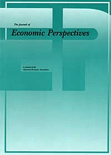
JOURNAL OF ECONOMIC PERSPECTIVES
Exploring the Depths of Economic Thought and AnalysisJOURNAL OF ECONOMIC PERSPECTIVES, published by the American Economic Association, is a leading academic journal that serves as a vital resource for researchers, professionals, and students in the fields of economics and econometrics. With an impressive impact factor, it ranks in the top Q1 quartile according to the 2023 statistics, demonstrating its significant influence and contribution to the discipline, particularly with a notable Scopus Rank of #21 out of 716 in the category of Economics and Econometrics. Spanning from 1992 to 2024, the journal provides a platform for rigorous and comprehensive analyses that illuminate contemporary economic issues and perspectives. While it does not currently offer open access options, its thorough and insightful content ensures it remains a respected and essential part of economic literature, addressing a diverse array of topics that resonate with the academic community.
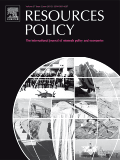
Resources Policy
Driving High-Impact Research for Effective Resource PoliciesResources Policy, published by ELSEVIER SCI LTD, is a prestigious journal that has been at the forefront of advancing knowledge in the fields of Economics, Law, and Sociology since its inception in 1974. With an impressive Q1 ranking in multiple disciplines—including Economics and Econometrics, Law, Management, Monitoring, Policy and Law, and Sociology and Political Science—this journal showcases high-impact research and insights that are vital for academics, policymakers, and practitioners alike. With Scopus rankings placing it in the top percentiles of its respective categories, Resources Policy fosters interdisciplinary dialogue, promoting innovative solutions and policies concerning the sustainable management and use of resources. While currently not an open-access publication, the journal ensures that its rich content is accessible to those pursuing rigorous research and professional excellence. As we approach its 50th anniversary in 2024, Resources Policy continues to be an essential platform for critical discussions, evaluation, and advancements in resource management.
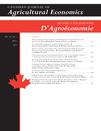
CANADIAN JOURNAL OF AGRICULTURAL ECONOMICS-REVUE CANADIENNE D AGROECONOMIE
Bridging Theory and Practice in AgricultureCanadian Journal of Agricultural Economics - Revue Canadienne d’Agroéconomie, published by Wiley, is a premier journal dedicated to the innovative and interdisciplinary study of agricultural economics. With an impressive impact factor highlighting its significance, this journal consistently ranks in the Q1 quartile across multiple categories, including Agronomy and Crop Science, Animal Science and Zoology, Ecology, Economics and Econometrics, and Global and Planetary Change. As part of its robust content, the journal spans articles from 1952 to 2024, contributing valuable insights into the interface of agricultural practices and economic theory. Researchers and professionals in the field will find this journal essential for exploring critical issues affecting agriculture, food security, and sustainability in a global context. Despite its traditional publishing model, the journal's rigorous peer-review process ensures high-quality scholarly contributions that are pivotal for advancing knowledge and academic discourse in agricultural economics.